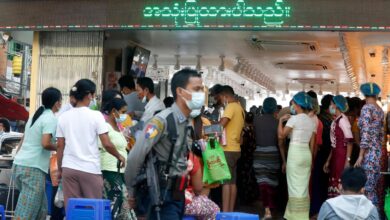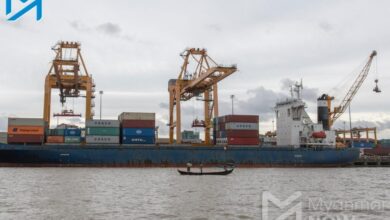
Global cigarette giant British American Tobacco (BAT) has announced it will halt its operations in Myanmar by the end of this year, making it the latest major foreign firm to leave the country since February’s coup.
The company, which produces the London, Kent, and Lucky Strike brands at its Yangon factory, re-entered Myanmar in 2013 a decade after being forced to leave amid pressure from campaigners who opposed its business dealings with the former junta.
Madeeh Pasha, BAT’s Area Corporate Affairs Manager for the Middle East & South Asia, said the departure came after an analysis of the company’s viability in the country, but did not elaborate or cite the coup as a reason.
“Like any global company, we continuously evaluate our operations around the world. Having evaluated the long-term operational and commercial viability of our business in Myanmar, we have taken the decision to withdraw from the country and cease all operations,” he said.
“The business discontinuation is expected to be completed by the end of 2021. We are in discussions with the impacted BAT employees about next steps and will remain committed to supporting them through the process,” he added. BAT Myanmar employs around 400 people.
Vicky Bowman, director of Myanmar Center for Responsible Business, said the departure raises human rights concerns.
“BAT needs to ensure that they exit responsibly, which means heightened human rights due diligence to fully identify the adverse human rights impacts of their departure and address these, particularly for the most vulnerable,” she said.
In 2016 BAT was accused of illegally marketing cigarettes to children in Myanmar, British newspaper The Times reported.
The company used to co-own its Myanmar operations with a military-run firm, but was forced to leave the country in 2003 following pressure from the Burma Campaign UK rights group.
It returned ten years later to start a joint venture with a subsidiary of the Sein Wut Hmon Group, a local conglomerate that in 2015 was accused of involvement in land grabbing by the watchdog Global Witness.
As of 2020, BAT holds just over 12.2% of the world’s cigarette market and has revenues of $16.5bn, according to Euromonitor International.
Numerous multinational companies have abandoned Myanmar since military chief Min Aung Hlaing plunged the country and its economy into turmoil by seizing power from the elected government on February 1.
The French energy giant EDF is among them, as are the fossil fuel companies Woodside and Petronas. Thai real estate firm the Amata Group, Hongkong and Shanghai Hotels, and Singaporean engineering firm Sembcorp have also ceased or suspended operations in Myanmar.
The Japanese beer giant Kirin has ended its dealings with a military-owned conglomerate, while Norway’s Telenor in July controversially announced the sale of its Myanmar business to M1 Group, a Lebanese company with a patchy human rights record.
Three quarters of Myanmar companies surveyed by the World Bank earlier this year said the impact of the coup on the economy was worse than the impact of the Covid-19 pandemic.
Firms’ confidence about the future was “extremely weak” amid uncertainty about how the environment for doing business will evolve, the Bank said. It added that the number of people living in poverty in Myanmar could more than double by the beginning of next year.



